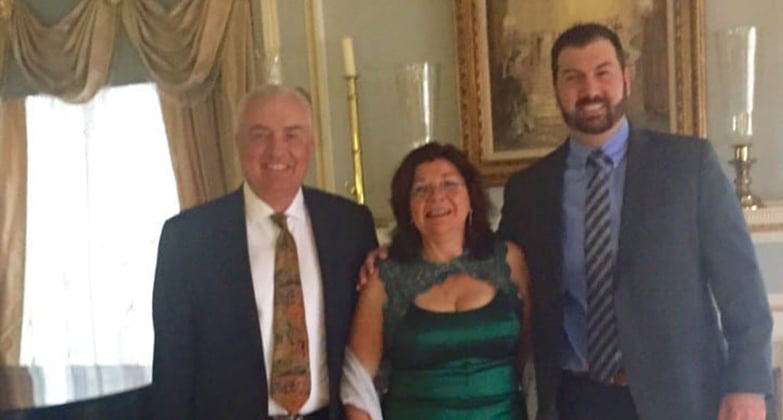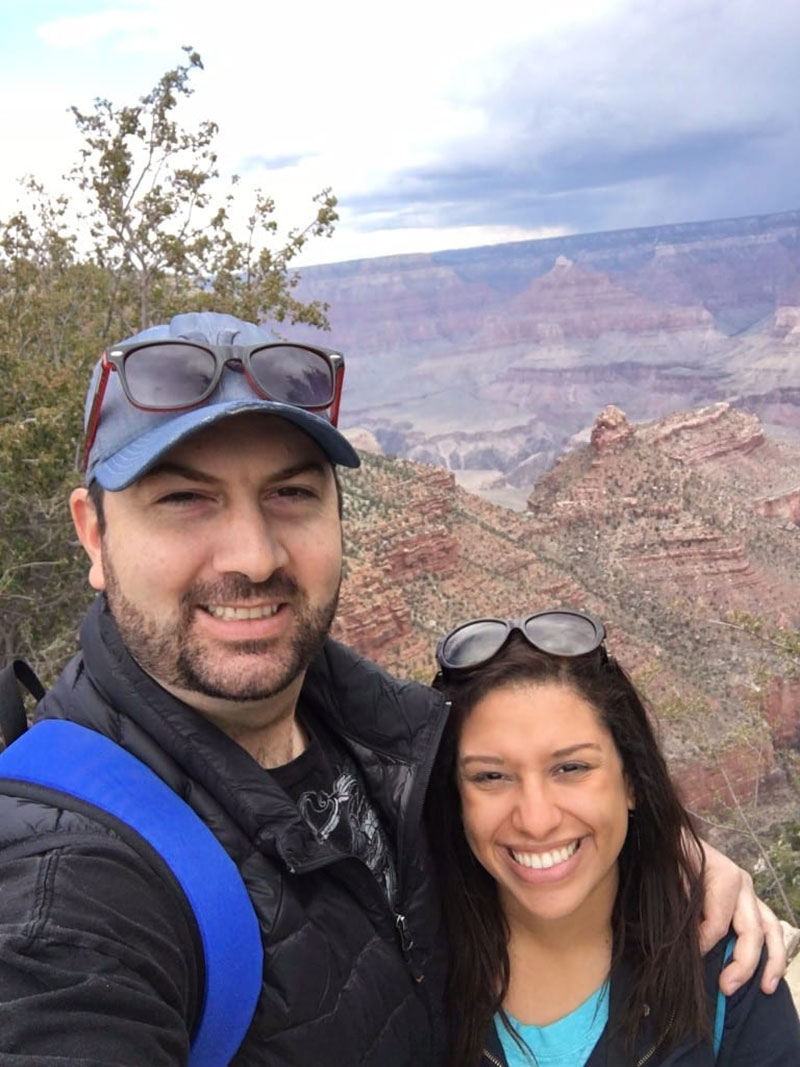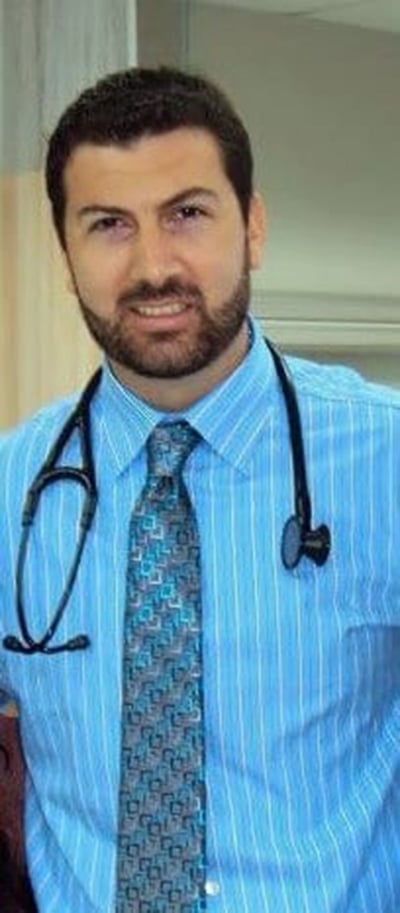 UMHS 2016 graduate Dr. Alexandru Cojanu was thrilled earlier this spring to learn he matched at Detroit Medical Center/Wayne State University in Psychiatry. It has been an incredible journey for Dr. Cojanu, originally from Romania. He started out majoring in Kinesiology (the science of human body movement) at the venerable College of William and Mary and graduated as a nationally ranked NCAA Division 1 tennis player. He became a professional tennis player and toured around the world, but his fascination with medicine only grew deeper while working as an athlete. His love of how the human brain works led to pursuing a master’s degree in Neuroscience at Virginia Commonwealth University. As Dr. Cojaunu explains, this was his introduction to the world of how the human brain functions. “Since I knew I wanted to work with people as opposed to being inside a lab, I chose medical school as the next step,” he says.
UMHS 2016 graduate Dr. Alexandru Cojanu was thrilled earlier this spring to learn he matched at Detroit Medical Center/Wayne State University in Psychiatry. It has been an incredible journey for Dr. Cojanu, originally from Romania. He started out majoring in Kinesiology (the science of human body movement) at the venerable College of William and Mary and graduated as a nationally ranked NCAA Division 1 tennis player. He became a professional tennis player and toured around the world, but his fascination with medicine only grew deeper while working as an athlete. His love of how the human brain works led to pursuing a master’s degree in Neuroscience at Virginia Commonwealth University. As Dr. Cojaunu explains, this was his introduction to the world of how the human brain functions. “Since I knew I wanted to work with people as opposed to being inside a lab, I chose medical school as the next step,” he says.
Dr. Cojanu first learned about UMHS from an old friend during a Skype call. When he saw his friend studying in the beautiful tropical surroundings of St. Kitts, Dr. Cojanu admits he was “immediately hooked” and started researching UMHS. He was particularly impressed by the experience of the Ross family and the fact that the fifth semester was back in the USA in Portland, Maine. He also liked having the ability to pursue third and fourth year clinical rotations all over the United States. The UMHS Endeavour caught up with Dr. Cojanu to talk about the long but rewarding road to residency, his advice for other Caribbean medical students, what interests him about Psychiatry, the thrill of getting the coveted “You Matched” email during Match Week, and much more.
 At-a-glance
At-a-glance
Free guide
Psychiatry: Is it the right specialty for you?
- Scope of Practice
- Subspecialties
- Future Job Outlook
Quick access. No spam. 11 pages.
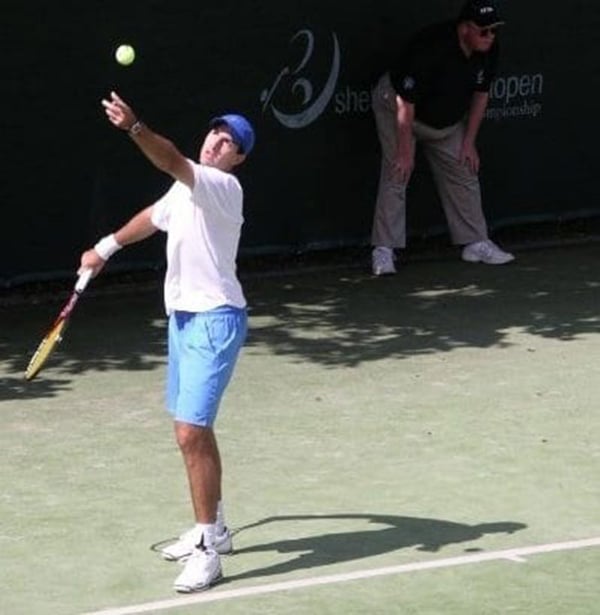
ON THE PRO TENNIS CIRCUIT: Alexandru Cojanu at a pro tennis tournament in Ireland. Photo: Courtesy of Dr. Alexandru Cojanu
UMHS Endeavour: Tell us a little about yourself and where you are originally from.
Dr. Alexandru Cojanu: I was born in Romania but moved to Florida right before high school. As a youngster I’ve always enjoyed competitive sports and pretty early on chose tennis as my number-one priority, competing in both national and international tournaments with a desire to “chase the dream” and turn pro one day. After high school I attended the College of William and Mary in Virginia, wanting to find a good balance between both academics and athletics. My parents instilled in me the benefits of a strong work ethic since I was young and that’s something that I try to apply on a daily basis in anything that I attempt. I graduated from William and Mary as a nationally-ranked NCAA Division 1 tennis player and with a degree in Kinesiology, which is the science of human body movement. I chose this major because I was very interested in how the human body functioned, especially given my athletics background, and the College had an excellent program encompassing the physiological, biomechanical as well as psychological components of this field. Having graduated, I decided to turn pro and ended up traveling the world playing tournaments as a Professional Tennis Player, winning three of them and achieving a career-high ATP ranking of 512 in the world. It was a very rewarding experience and one that ultimately played a major role in shaping my future. Not only was I able to visit places that most people only read about, but also interact with a variety of very interesting people whose life stories I found fascinating. I realized I wanted to learn more about how people make choices, decisions and ultimately how the brain works so I went back to school and earned a Master’s in Neuroscience from Virginia Commonwealth University. This was my initial introduction into the fascinating world of how the brain functions. Since I knew I wanted to work with people as opposed to being inside a lab, I chose medical school as the next step. As I continued my studies and went through different rotations, this passion for understanding people and their mental well-being only grew stronger; therefore, pursuing a Psychiatry Residency, given my background and interests, was the clear choice.
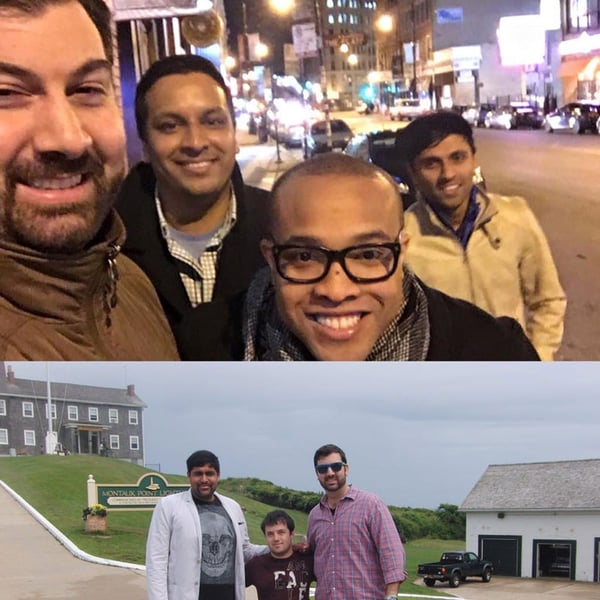
WITH FRIENDS IN ROTATIONS: Dr. Alexander Cojanu with friends during clinical rotations. Photos: Courtesy of Dr. Alexandru Cojanu
Why did you decide to go to UMHS?
As most people know, researching medical school programs can be a very tedious task. There are a lot of variables to take into consideration, especially when considering attending medical school in the Caribbean: the school’s reputation, the island itself, the studying environment as well as professors and resources available to students. I had a number of friends attending other “big name” Caribbean medical schools and each had their pros and cons. However, I had a childhood friend who was at UMHS and I remember one of our Skype conversations where he was at the outdoor tables under the “lunch tent,” with a view of the field and the ocean behind him. I was immediately hooked and started researching UMHS more, discovered the experience that the Ross family brought to the school and was impressed by the credentials of the faculty. Being a newer school, I also believed that, at least initially, students would have greater input into tailoring the learning experience to benefit their individual learning styles. Additionally, compared to other Caribbean schools, I was also drawn to the fact that UMHS’s fifth semester was stateside, in Maine, which I saw as a benefit. Although I wasn’t aware of this when I first started, the ability to pursue third and fourth year clinical rotations all over the U.S. was invaluable. I’ve always loved traveling because it provides some of the best life lessons and the same can be applied to one’s medical training. I rotated through 12 different settings (seven hospitals and five offices) and was able to see firsthand the differences between not only providers, but also the healthcare settings they worked in. It was a great experience that offered me the opportunity to take what’s best from a large pool of physicians and other healthcare workers in order to create my own individual practice style for the future, emulating these qualities.
What was the greatest thing about learning you matched?
Getting the “You Matched” email on Monday of Match Week was an incredible feeling that truly justified the previous years of hard work and sacrifices, both on my part as well as my family’s. There have been plenty of people along the way that have helped me and provided me with guidance and advice over the years and it was great being able to call and tell them the great news. It truly was a surreal feeling that didn’t fully set in for a couple of days. Medical school was tough, the application process was time-intensive and stressful but knowing that everything you’ve worked for was finally realized and having a confirmation email (which you double-check every half hour for the first day) is quite relaxing. The only stressful/annoying part about the whole process was having to wait until Friday to find out “where” I matched and was very ecstatic to find out it was in my desired specialty at an excellent University program, top choice, Detroit Medical Center/Wayne State University.
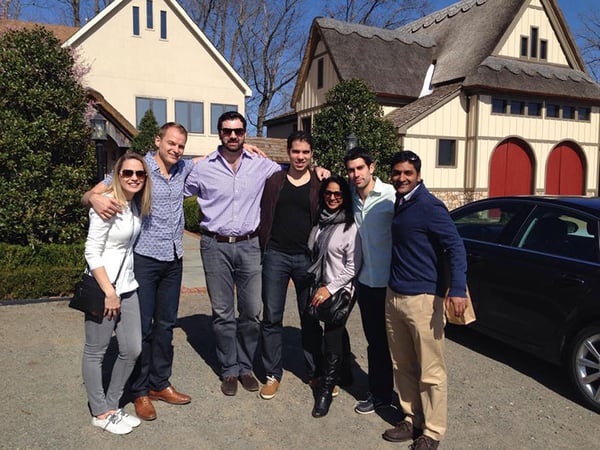
WITH CLOSE FRIENDS: Dr. Alexandru Cojanu with friends. Photo: Courtesy of Dr. Alexandru Cojanu
Is there anything in particular that interests you about Psychiatry as a specialty?
I think Psychiatry is a fascinating field. My background in Neuroscience and athletics played a major role in choosing this field; however, I didn’t know how much I enjoyed it until dealing firsthand with patients during my clinical rotations. Having the ability to apply clinical and pharmacological knowledge in the treatment of one’s disease is a staple of most medical professions. However, Psychiatry delves even deeper into the human psyche to fully understand the neurobiological, chemical, physiological as well as psychosocial aspects of one’s condition. Throughout my clinical rotations, I’ve witnessed how different specialties deal only with their own individual organ systems, in many cases without any deeper questioning of how the disease process affects the individual on a mental health level. To me, Psychiatry is more than just a medical science because it is applied to the human condition and all that influences it. As a Psychiatrist, my job will not entail looking at a patient as just a disease process, but as an individual embedded in a larger social, cultural and religious system, which ultimately will influence their interpretation of illness, especially as it relates to mental health. Additionally, there is a large potential for growth within this field, with current research focused on better understanding how neurochemical imbalance and even genomics cause disruptions in the brain’s pathways, which I find very interesting.
What advice do you have for current UMHS students, and medical students in general, about the match process?
The best advice I’ve gotten was to “put in the time” into researching career paths, programs and the application process itself. Don’t base your decisions solely on the advice of others or random websites. Make sure you do your homework about requirements and especially deadlines as these will come much quicker than you will anticipate. Ultimately, trust yourself to do the right thing and spend as much time as possible on your application and Personal Statement. During my interviews, I was repeatedly asked about my LORs and details from my PS, so make sure you find a way to clearly and honestly explain who you are, your story and your ultimate goals in that one page. Also, make sure your letters of recommendation are from preceptors who really got to know you and your work ethic and definitely ask for them as early as possible. Physicians are busy and are more likely to write a heartfelt, personalized letter if given advanced notice versus a generalized LOR. Program Directors see thousands of applications during the Match process and will quickly discern between a letter describing you as an individual compared to one that offers all the generalized positive adjectives clumped together. Ultimately use all the resources available to you and definitely read and follow all the emails from Patrick McCormick as they are the sole UMHS source of knowledge from his vast experience as well as from previous graduates.
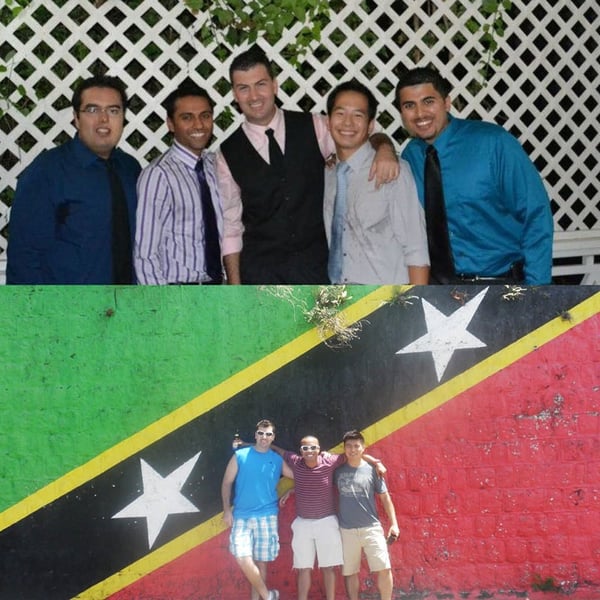
DR. COJANU & FRIENDS: In St. Kitts. Photo: Courtesy of Dr. Alexandru Cojanu
Are there any advantages or disadvantages for students at Caribbean medical schools regarding the match process?
There are obvious disadvantages to being an IMG during the Match process. The rule of thumb, as I understand it, is that applications from U.S. medical grads (both MD and DO) will be looked at before any IMG’s application. However, this is not set in stone. The USMLE Steps are a major equalizer, as are clinical rotation grades and your LORs. Understand that you will not be any program’s number-one choice solely based on your application but you are automatically on the same playing field as everyone else once you receive the Interview and that’s where you can excel. I fully believe that the adversity faced by Caribbean students forces us to become hard workers because we learn to expect that nothing will be handed to us. This is a real positive and one that any applicant should emphasize during the Interview process. A lot of times, we, as Caribbean students, have to find our own answers, do our own research regarding clinical rotations and especially regarding Residency Programs. We have the added benefit of completing clinical rotations at different sites during both third and fourth year, which I see a huge positive as it opens one’s eyes to different styles, healthcare systems and a multitude of physicians to learn from. Even more important to me was the fact that a lot of rotations available at UMHS are not at big university centers (both positive and negative depending on the specialty you desire), instead offering one-on-one time with experienced physicians and no residents in-between.
Do you have any specific goals for your residency?
My main goal is to take the same approach I did while in clinical rotations. I want to learn as much as possible from as many different healthcare providers as I can. I am excited about being at Detroit Medical Center - Wayne State University because this is a large university program that will give me the widest exposure to all that Psychiatry has to offer. Training at a program that spans a university hospital, a private hospital and a VA Hospital in addition to multiple outpatient specialized clinics and world-renowned faculty will ensure that my next four years will be packed with relevant, evidence-based knowledge and ample learning opportunities. My ultimate goal is to come out of residency as a well-rounded Psychiatrist who will have seen a great majority of the pathology involved in the field, therefore being able to comfortably practice in any setting for the rest of my career knowing that I know what to do (as well as who to get specialized advice from) at any point.
Is there anything else you’d like to add that we have not covered?
The best advice I can give is to make sure you surround yourself with positive people and stay away from potentially toxic environments. My parents and very close friends have been a constant source of support throughout this journey and have played a major role in keeping me focused on the end-goal. They deserve a lot of the credit for my achievements, by keeping me grounded and offering support and guidance at any point along the way. Also, make sure you find a good balance between work and play; have fun along the way, because those are the moments you will most remember down the road. Just keep chugging along…dedication, hard work and sacrifices are all worth it when you’re surrounded by those close to you on Monday of Match Day, opening the email that finally validates your M.D. with a residency spot.
ALEXANDRU & FRIEND. Photo: Courtesy of Dr. Alexandru Cojanu
(Top photo) WITH HIS PARENTS: Dr. Cojanu (far right) with his mother & father. Photo: Courtesy of Dr. Alexandru Cojanu
 At-a-glance
At-a-glance
Free guide
Psychiatry: Is it the right specialty for you?
- Scope of Practice
- Subspecialties
- Future Job Outlook
Quick access. No spam. 11 pages.
About UMHS:
Built in the tradition of the best US universities, the University of Medicine and Health Sciencesfocuses on individual student attention, maintaining small class sizes and recruiting high-quality faculty. We call this unique approach, “personalized medical education,” and it’s what has led to our unprecedented 96% student retention rate, and outstanding residency placements across the US and Canada. UMHS is challenging everything you thought you knew about Caribbean medical schools.

Scott is Director of Digital Content & Alumni Communications Liaison at UMHS and editor of the UMHS Endeavour blog. When he's not writing about UMHS students, faculty, events, public health, alumni and UMHS research, he writes and edits Broadway theater reviews for a website he publishes in New York City, StageZine.com.













